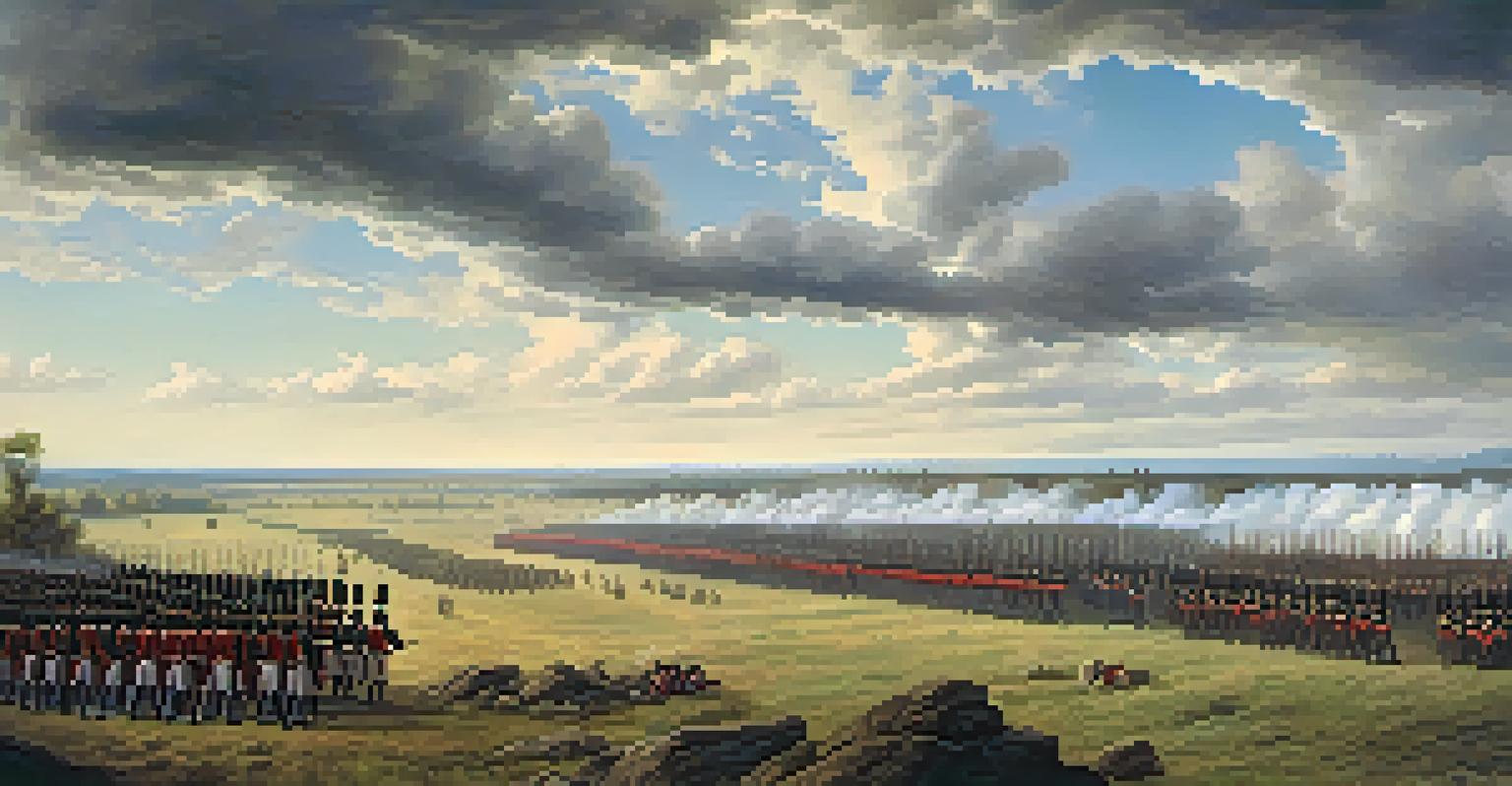Entertainment vs. Accuracy: The Dilemma in Historical Films

Understanding the Appeal of Historical Films
Historical films captivate audiences by transporting them to different eras, making history feel alive. They blend education with entertainment, allowing viewers to engage with the past in a way that textbooks often can't. These films often highlight pivotal moments or influential figures, sparking curiosity about real events and people.
History is not a burden on the memory but an illumination of the soul.
When done well, historical films can inspire viewers to explore history further, prompting them to read more about the subject matter. However, the challenge lies in balancing accuracy with the elements that make a film engaging. Audiences often prioritize entertainment, which can lead filmmakers to prioritize storytelling over factual precision.
This entertainment factor can sometimes lead to a romanticized portrayal of events, which may mislead viewers about what really happened. While this can enhance the cinematic experience, it raises questions about the responsibility of filmmakers in portraying history accurately.
The Fine Line Between Fact and Fiction
In the realm of historical films, the line between fact and fiction often blurs. Filmmakers must decide how much creative license to take while still respecting the essence of historical events. This decision-making process can lead to debates about what constitutes a 'true' story and how much fictional embellishment is acceptable.

For instance, consider films like 'Braveheart,' which, while entertaining, takes significant liberties with historical facts. Such dramatizations can create a more compelling narrative but may also lead to misconceptions about the actual events and figures involved. This raises the question of whether audiences can differentiate between dramatization and reality.
Entertainment vs. Historical Accuracy
Filmmakers often struggle to balance engaging storytelling with the accurate portrayal of historical events.
Ultimately, the challenge is to create a film that resonates with viewers while still honoring the truth of the past. Striking the right balance can be tricky, as filmmakers often face pressure from studios and audiences to prioritize entertainment value.
Audience Expectations and Historical Accuracy
Audiences come to historical films with varying expectations, often influenced by their prior knowledge of the subject matter. Some viewers seek a faithful retelling of events, while others are more interested in a gripping story, regardless of its accuracy. This discrepancy can create tension between filmmakers and audiences.
We are all historians now; we must be careful about the stories we tell.
For example, documentaries typically prioritize factual accuracy, while historical dramas may lean more towards storytelling, resulting in a blend of fact and fiction. This leads to questions about what audiences are willing to accept as 'truth' in the context of entertainment. The risk is that inaccuracies may become ingrained in popular culture, influencing public perception.
Filmmakers must navigate these expectations carefully, aware that their portrayal of history can shape societal understanding of significant events. The challenge is to find a way to entertain while still providing a version of events that is as accurate as possible.
The Role of Research in Historical Filmmaking
Research plays a crucial role in the development of historical films, ensuring that filmmakers have a solid foundation of knowledge to draw from. This process often involves consulting historians, reading primary sources, and analyzing various interpretations of events. However, the depth of research can vary significantly among filmmakers.
Some directors and writers are committed to historical accuracy, investing time and resources to create a well-researched narrative. Others may prioritize storytelling over thorough research, leading to a final product that entertains but may misrepresent key facts. This inconsistency can impact the overall quality and credibility of the film.
Impact on Public Perception
Historical films can shape societal understanding and misconceptions, particularly for audiences who rely on cinema for their knowledge of history.
Ultimately, the level of research conducted can greatly influence how audiences perceive the film's authenticity. When filmmakers take the time to understand the historical context, they can create a more nuanced portrayal that resonates with viewers and educates them about the past.
Impact of Historical Films on Public Perception
Historical films can significantly shape public perception, often serving as the primary source of information for many viewers. When films present a skewed version of history, they can lead to widespread misconceptions that influence societal understanding. This impact can be profound, particularly for younger audiences who may rely on cinema for their historical knowledge.
For example, films like '300' and 'Pearl Harbor' have sparked discussions about their portrayals of events, leading audiences to question the accuracy of what they’ve seen. When a film becomes popular, its narrative can overshadow historical facts, making it essential for filmmakers to consider the consequences of their choices.
As a result, filmmakers hold a unique responsibility to present a balanced view of history, recognizing their power to influence how events are remembered and understood. This calls for a careful approach that prioritizes both storytelling and factual integrity.
The Rise of Historical Documentaries
In response to the complexity of balancing entertainment with accuracy, there has been a notable rise in historical documentaries. These films often prioritize factual accuracy, providing viewers with a deeper understanding of the subject matter without the embellishments of dramatic storytelling. As such, they serve a different purpose while still engaging audiences.
Documentaries can explore topics in greater depth, often featuring interviews with historians, experts, and eyewitnesses. This allows for a more comprehensive perspective on historical events, offering insights that may not be present in traditional historical dramas. The format can also highlight multiple viewpoints, enriching the audience’s understanding.
Rise of Documentaries
The increase in historical documentaries reflects a shift towards prioritizing factual accuracy while still engaging viewers.
However, even documentaries can face challenges regarding bias and interpretation. The way information is presented can still influence audience perception, underscoring the need for filmmakers to approach their subjects with integrity and an open mind.
Finding a Middle Ground: Blending Fact and Fiction
As the debate over entertainment versus accuracy continues, some filmmakers are finding innovative ways to blend fact and fiction. By incorporating real historical events into compelling narratives, they can create films that both entertain and educate. This approach allows audiences to engage with history in a way that feels relatable and relevant.
For instance, films like 'The Imitation Game' and 'Hidden Figures' successfully intertwine factual events with character-driven storylines, making complex topics accessible to viewers. This blend can lead to a greater appreciation for history while still maintaining the emotional impact that good storytelling provides.

Ultimately, this middle ground offers a promising way to address the dilemma of accuracy in historical films. By prioritizing both elements, filmmakers can create works that resonate with audiences while honoring the truth of the past.